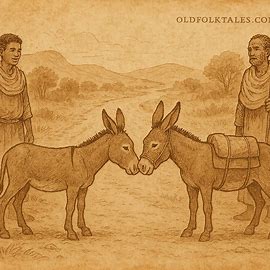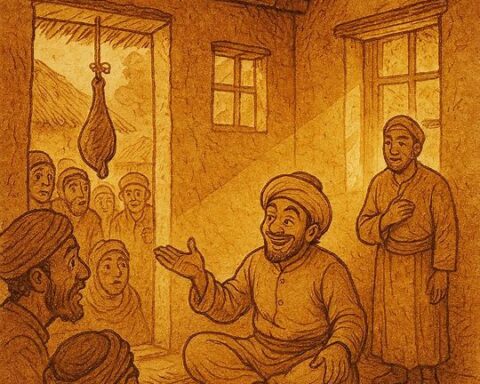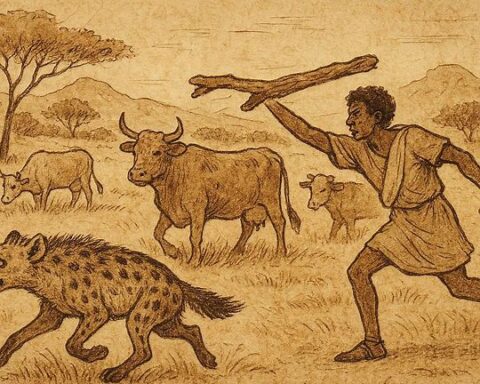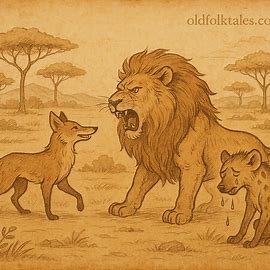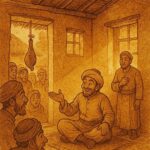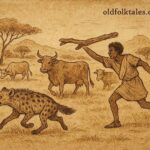On a long road winding through the rugged highlands of Eritrea, two men journeyed beneath the morning sun, each guiding a donkey by his side. The air was sharp with dust, and the rhythm of hooves striking the earth echoed in the silence. As the men drew near, they raised their hands in greeting, exchanging polite words of peace and blessing. Their donkeys too, as though moved by the same instinct, pressed their muzzles together, breathing softly into each other’s faces.
The first man chuckled, amused by the sight. “We have greeted each other as men,” he said, “but why do our donkeys also press their heads together? What do they gain from such a gesture?”
The second man, wiser and slower in speech, paused before answering. He gazed at the donkeys, their large eyes solemn, their ears flicking against the flies. Then he said: “Do you not know? This is no ordinary greeting. The donkeys whisper of matters far greater than ours. They ask after the return of their messenger, the strong donkey sent long ago to plead before the Lord. Their plaint is simple: to be freed from the tyranny of men.”
The first man’s smile faded into silence. He turned to study the beasts again, no longer seeing mere animals, but creatures bound to labor, enduring endless burdens.
The Whispers of the Donkeys
It is said among the Tigrean people that donkeys, whenever they meet, press their mouths together not in play nor idle curiosity, but in remembrance. Their breath carries the same question from one to the other: “Has the messenger-donkey returned with the Lord’s answer?”
Each greeting is an echo of hope. They remember the brave one chosen among them, strong of back, patient of spirit, who went to the heavens to speak for his kin. His mission was to seek justice, to beg release from the endless weight of sacks, jars, and firewood strapped across weary spines. And though no man heard the outcome, the donkeys still await news.
Thus, whenever two donkeys meet, they bow their heads and touch mouths, as though passing along a secret prayer: “Do you know if we are closer to freedom? Has the Lord spoken?”
The Men Reflect
The two men walked on, the dust of the road swirling about their sandals. Neither spoke for a long while, but each carried the thought in his chest. The first man felt a pang of guilt as he tugged at his donkey’s rope, remembering the many times he had beaten it when it stumbled. The second man, though used to his beast’s strength, now wondered whether its silence masked a hidden grief.
For in that moment, both men understood: these animals, so often dismissed as lowly and stubborn, longed for the same thing all creatures yearn for, liberty.
The Tale’s Meaning
From this story, the Tigrean elders teach that every creature under the sun shares a desire for freedom. Chains, whether of iron or duty, weigh upon the spirit. Even the donkey, patient bearer of man’s burdens, dreams of a life without the whip or the yoke. To press noses together is not simply habit, but ritual, an ancient act of remembrance, a sigh of solidarity, a small gesture of faith that one day the message will return and their labor will end.
Moral Lesson
The tale of the two donkey-owners teaches us that freedom is not the longing of humankind alone, but a universal desire. Just as the donkeys remember their messenger and quietly hope for release, so too do people, nations, and generations yearn for liberty from oppression, toil, or hardship.
It reminds us to treat those under our care, whether beasts, neighbors, or kin, with compassion. The burdens we impose may seem small to us, but they weigh heavily on the backs of others. The story calls us to recognize the dignity of all living beings and to remember that in every heart, whether human or animal, the song of freedom beats alike.
Knowledge Check
1. Why did the two men’s donkeys press their mouths together?
They were asking each other if the messenger-donkey had returned with news from the Lord.
2. What mission was the strong donkey sent on?
To plead before the Lord that donkeys be freed from the burdens placed upon them by humans.
3. What does the donkey’s greeting symbolize in Tigrean tradition?
It symbolizes remembrance, solidarity, and the shared hope for freedom.
4. How did the first man react after hearing the explanation?
He grew silent, reflecting on the suffering of his own donkey and the weight of its burdens.
5. What universal lesson does the tale highlight?
That every living creature, not only humans, yearns for liberty and relief from oppression.
6. From which cultural origin does this folktale come?
It is a Tigrean (Tigrinya) folktale from Eritrea.
Source: Tigrean (Tigrinya) folktale, Eritrea.
